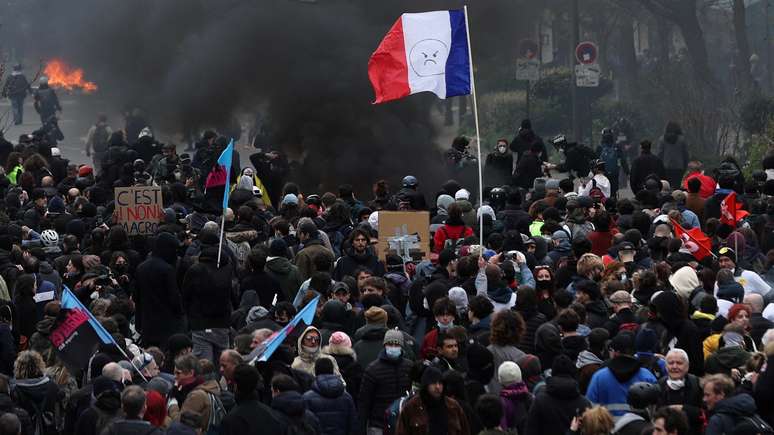The pension reform, adopted by Emmanuel Macron’s government without legislative approval, is the subject of protests and strikes.
Millions of protesters in the French streets. About 10,000 tons of garbage piled up on the streets of Paris. Gas stations out of gas after strikes at major national refineries.
After all, what is behind the current situation in France?
The pension reform
The root of the current wave of popular dissatisfaction is a reform of the social security system signed by the government of Emmanuel Macron in mid-March. Increases the minimum retirement age from 62 to 64 for most categories.
The government argues that the reform is necessary to support social security, which is increasingly difficult given the decline in the ratio between active and retired.
In 2021 alone, pension spending cost the public coffers almost 14% of France’s GDP, almost double the average for the countries of the Organization for Economic Co-operation and Development (OECD).
According to an expert report commissioned by the government, these expenditures could still lead to a deficit of 10 billion euros a year between 2022 and 2032.
Even with the change, the minimum retirement age in France is still lower than in European neighbors such as Germany, the United Kingdom, Belgium, the Netherlands, Spain and Italy, where it ranges between 65 and 67.

In Brazil, the minimum retirement age by age is currently 62 for women and 65 for men, with a minimum contribution period of 15 years. The norm was established by the reform approved in 2019, during the government of Jair Bolsonaro.
But the feeling of revolt in France is also linked to the way in which the reform was launched.
Macron’s coalition lost its majority in the National Assembly in the 2022 legislative elections. As a result, the government did not get the necessary support to pass the reform through parliamentarians and had to activate a special provision of the Constitution, called 49-3 , which allows the change to take effect without legislative approval.
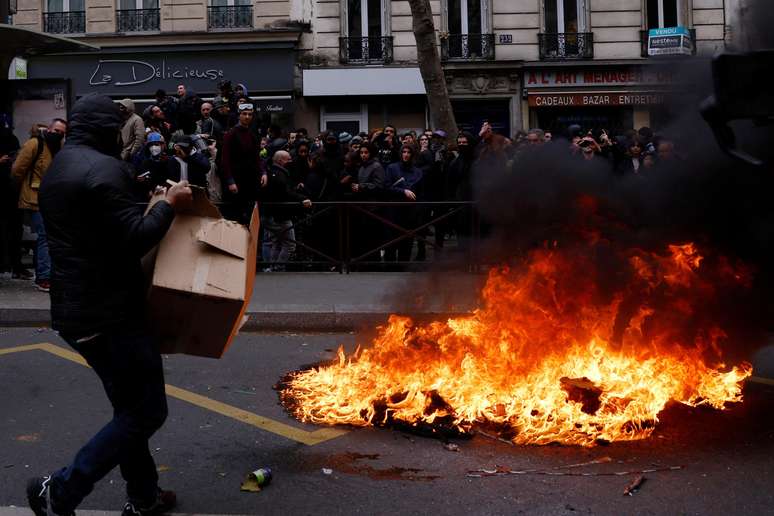
The feature was criticized by members of the opposition and sparked further protests.
For Queen Mary University professor and French political expert Rainbow Murray, the government’s action was seen by many as “a trampling on parliamentary democracy and the will of the people”.
The demonstrations
With all this, last Tuesday (28/3) the country reached its tenth day of popular demonstrations.
The total number of people on the street varies greatly depending on the source. But, according to one of the country’s main trade unions, more than 2 million people attended the shows across France on Tuesday alone, half a million in Paris alone.
The Interior Ministry and the Parisian police force represented an estimated 740,000 and 93,000 French respectively on the streets across the country and in the capital.
In the previous week’s act, the government had counted 2 million protesters across France.
And while most mobilized peacefully, there were clashes between some groups and the security forces.
In one of the most violent days, more than 450 people were arrested by police nationwide and 903 fires were lit by protesters on the streets of Paris.
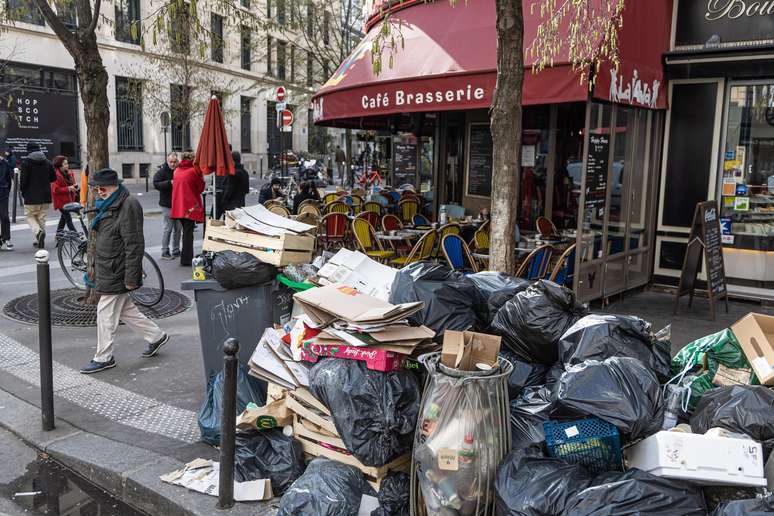
And at the same time as they took to the streets, different categories organized strikes. Airports, schools and oil refineries have all been affected as a result, causing an estimated 17% of all fuel stations in the country to go short of at least one type of fuel.
Public cleaners are also on hold for several days, for whom the social security reform plans to change the minimum retirement age from 57 to 59 years.
Thus, in recent weeks, images of the streets of Paris full of garbage have become a common sight, raising fears of a public health problem.
bomb theme
But it is not the first time that scenes of this type have been recorded in the capital. Over the past 30 years, every attempt at pension reform has been met with demonstrations, strikes and union protests.
According to specialists, there is a unique component of France: a history of resistance to changes in the social security system, as well as a long tradition of unionist and popular movements.
According to Rainbow Murray, the way French society views retirement influences the reaction to the government’s recently announced changes.
“The French are very fond of the idea of a long, state-funded retirement, especially those in more physically demanding and less pleasant professions – for whom a longer career is an unattractive prospect,” he says.
Emmanuel Macron himself has already encountered difficulties approving such proposals. In late 2019 and early 2020, during his first term, a similar movement was organized in light of the announcement of plans to unify all 45 pension systems in the country.
The government also insisted on changing the minimum retirement age, but decided to postpone the project when the country went into lockdown due to the first cases of Covid-19.
But the reform is an electoral promise from Macron and has been included in his government plan. And he’s said over and over that he doesn’t intend to abandon his plans for him.
“Do you think I’m enjoying passing this reform? No,” the president said in a television interview. “The longer we delay, the more the deficit will grow.”
“This renovation is not a luxury, it’s not a pleasure, it’s a necessity.”
political crisis
The current crisis is the first major obstacle Macron faces in his second term.
Polls show that his government’s approval rating has dropped 4 percentage points in a month, and is currently at 30%.
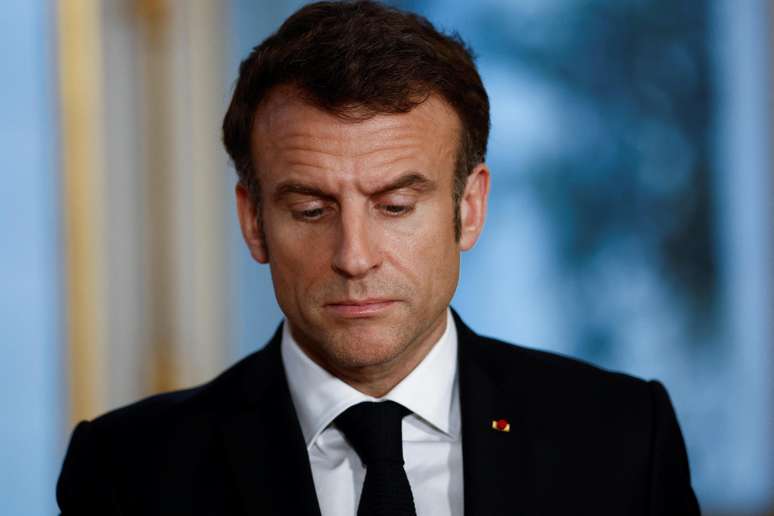
Furthermore, the crisis led the government to face two motions of no confidence in the National Assembly, which were not approved.
Had any of the votes been successful, Prime Minister Élisabeth Borne and the entire government cabinet would have been overthrown, the reform reversed, and Macron would have had to form a new government.
But, according to experts, the crisis could worsen further. There are those who fear a broader social revolt, similar to the one registered in 2018 against fiscal and social reforms, known as the yellow vest movement.
For political scientist Rainbow Murray, popular dissatisfaction is also a response to Macron’s style of government.
“Macron is a staunch politician and does what he believes is best, but he can appear arrogant and unwilling to listen to the public. He has even earned the nickname of president of the wealthy because many of his policies are said to have benefitted citizens the most “wealthier than workers,” he says.
Criticisms leveled at the president for wearing a luxury watch in an interview about the crisis reflect this impression given by the president.
According to his team, he took off his watch because it rattled on the table during the broadcast. But, for critics, the luxury item symbolizes his lack of contact with the population.
There were those who said that the watch would be worth up to 80,000 euros, the equivalent of R$ 450,000. But the government has revealed that he was wearing a customized model of a watch that costs between 1,660 and 3,300 euros on the internet, or R$9,400 and R$18,600, without customization.
Many French analysts say that Macron, who belongs to the centre-right, has lost his majority in the National Assembly precisely because of his way of governing and his economic plans.
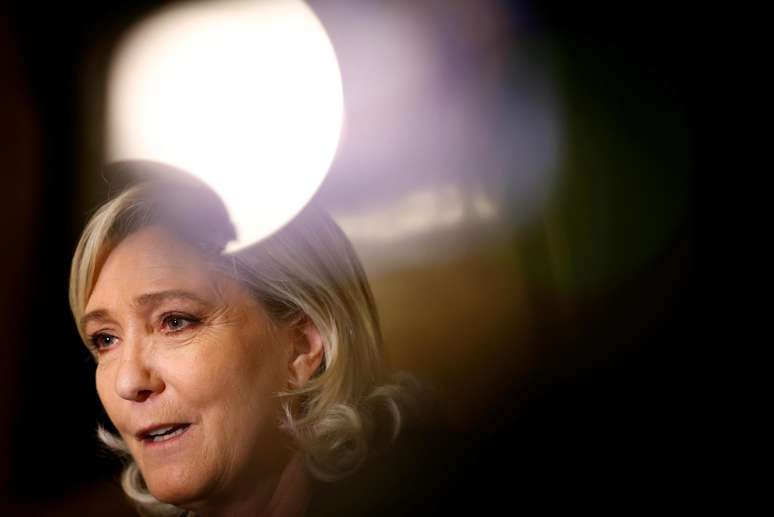
Meanwhile, the radical right, represented by Marine Le Pen’s National Union party, has achieved a historic result and has multiplied its representatives in the Assembly by 10.
And experts say the whole backlash from pension reform could open the door to even more growth for the radical right in France.
According to a poll released on March 19, 26 percent of voters would vote for the National Union if legislative unions are held today. That’s 5 percentage points higher than 5 months ago.
Economic losses?
Some say that the strikes and demonstrations will weigh heavily on France’s pockets, but several economists are ruling out major losses, despite the repercussions on the fuel and transport markets.
Economist Emmanuelle Auriol, of the Toulouse School of Economics, told the BBC she estimates an impact of something between 0.1 and 0.2 percentage points on French quarterly GDP growth.
But he argues that the effect shouldn’t be uniform. “Some industries are more affected than others,” he said.
The government and other advocates of the reform say the savings to be made from pension swaps are immensely greater than these possible economic impacts of the disruptions.
– This text was published in https://www.bbc.com/english/articles/c2errjyq8myo
Source: Terra
Rose James is a Gossipify movie and series reviewer known for her in-depth analysis and unique perspective on the latest releases. With a background in film studies, she provides engaging and informative reviews, and keeps readers up to date with industry trends and emerging talents.

